Disclaimer: This article is for informational purposes only and does not constitute medical advice. Always consult with a healthcare professional before starting any detox program. The products mentioned are not FDA-approved for drug test detoxification purposes.
Understanding THC Metabolism and Detection
As a heavy user, detoxing from THC takes a significant amount of time. This happens because THC (tetrahydrocannabinol) accumulates in the body’s fat cells and is then slowly released into the bloodstream.
The more frequently you use, the more THC builds up, extending the detox period. According to research published in the journal Drug and Alcohol Dependence, THC can be detected in heavy users’ urine for up to 30 days after last use, and in some cases, even longer. The primary metabolite that drug tests look for is THC-COOH (11-nor-9-carboxy-THC), which can remain in your system long after the psychoactive effects have worn off.
When THC enters your body, it’s rapidly metabolized by liver enzymes. About 65% of the THC is excreted in feces and about 20% in urine as metabolites. The remainder can be stored in body fat for extended periods, which explains why heavy users experience such lengthy detection windows.
This can be problematic if you need to pass a drug test, as heavy users can test positive in urine tests months after they stop using marijuana. Blood tests typically have a shorter detection window (up to 7 days for heavy users), while hair tests can detect use for up to 90 days regardless of frequency.
In this comprehensive guide, I’ll explore evidence-based THC detox methods for heavy users, focusing on approaches that research suggests may be effective for managing THC levels in your system.
Important Health Considerations
Before discussing detox methods, it’s important to understand a few key points about cannabis cessation.
For heavy users, sudden cannabis cessation may lead to withdrawal symptoms including irritability, sleep disruption, decreased appetite, and mood changes. These symptoms typically peak within the first week of abstinence and gradually improve. The intensity of withdrawal symptoms generally correlates with the frequency and quantity of previous use. Some users report anxiety, restlessness, and vivid dreams during the initial detox period. These symptoms are not dangerous but can be uncomfortable.
There is no scientifically validated “quick fix” for eliminating THC from your system rapidly. The body naturally eliminates THC through its own detoxification mechanisms centered in the liver. This process takes time and cannot be dramatically accelerated.
Individual results vary greatly based on metabolism, body composition, usage frequency, potency of consumed cannabis, and other health factors. People with higher body fat percentages tend to retain THC metabolites longer, as do those with slower metabolisms. Even factors like age and sex can influence how quickly your body processes THC.
If you’re detoxing for health reasons rather than testing purposes, consider speaking with a healthcare provider about developing a personalized plan. They can help monitor your progress and address any withdrawal symptoms that might arise. Some healthcare providers specialize in cannabis cessation and can provide evidence-based support.
Types of Detox Approaches
You can choose from two main detox approaches: same-day detox (or cleansing) and permanent detox.
Same-Day Detox
Same-day detox helps to temporarily reduce the concentration of marijuana metabolites in your urine. This means that on the day of your drug test, your urine may show lower levels of metabolites. Remember, this method is only intended for passing a drug test and does not actually remove THC from your body’s tissues.
While you don’t necessarily need to quit using marijuana completely for this approach, it’s strongly recommended to abstain before the test to improve your chances of success. Many toxicologists recommend at least 48-72 hours of abstinence before attempting a same-day detox procedure.
Same-day approaches typically increase urination frequency and may temporarily prevent new metabolites from entering the urine, potentially lowering THC levels below detectable thresholds. The science behind this approach is based on the principle of dilution combined with masking agents that help maintain the appearance of normal urine.
Common ingredients in these products include diuretics that stimulate urination, fiber to bind with bile and prevent reabsorption of THC, vitamins B and C to restore urine color (as diluted urine lacks the natural yellow color), creatine to maintain creatinine levels (which are checked in many drug tests), and minerals to adjust urine specific gravity (another quality labs test to detect dilution).
Be aware that these products might also increase bowel movements and could cause dehydration if you don’t drink enough water. Some users report headaches, dizziness, and electrolyte imbalances when using same-day detox products, especially if proper hydration isn’t maintained.
Scientific perspective: It’s important to note that the scientific evidence supporting the effectiveness of same-day detox products is limited. A 2019 systematic review in the Journal of Analytical Toxicology found insufficient evidence to confirm that detox drinks reliably help pass drug tests. Modern drug testing labs have sophisticated methods to detect adulterants and sample manipulation. Some detox products may work by simple dilution, which labs can often detect through testing for creatinine levels, specific gravity, and other urine characteristics.
Permanent Detox
Permanent detox aims to clear your body of all marijuana metabolites through sustained approaches. This method is ideal if you’re looking to quit marijuana completely or if you have enough time before a drug test.
However, permanent detox isn’t quick. Research shows it takes at least 7 days for light users, and for heavy users, it often takes 10 days or more, with some studies indicating up to 30 days for complete elimination. A comprehensive study published in the Journal of Analytical Toxicology found that chronic heavy users might test positive for THC metabolites for up to 77 days after cessation, though this is an extreme case.
THC is fat-soluble, meaning it lingers in fat cells. For heavy users who have accumulated more THC over time, it naturally takes longer to cleanse. Some users have reported testing positive for up to 7 months after quitting, though this is unusual. The half-life of THC-COOH in chronic users is approximately 5-7 days, meaning it takes about a week for your body to eliminate half of the metabolites present at any given time.
When undergoing permanent detox, you might notice fluctuations in the amount of THC metabolites detected in your urine. This is normal and happens because stored THC is released from fat cells at variable rates, especially during periods of fat metabolism such as exercise or fasting.
I’ll discuss evidence-based methods that may help reduce this period, though expectations should be realistic. The most reliable approach combines natural bodily processes with healthy lifestyle modifications to support your body’s natural detoxification pathways.
Typical ingredients for such approaches include various natural herbs and compounds that may support your body’s natural elimination processes. Some of these include milk thistle for liver support, niacin for circulation, and fiber to bind with bile containing THC metabolites in the intestines.
You can combine these methods. For instance, if you have a drug test, you might start with lifestyle changes aimed at permanent detoxification and consider a same-day approach on the test day. This combined approach gives you the best chance of success by reducing your overall THC burden before employing last-day methods.
Initially, you need to decide which approach is right for you based on your goals and timeline. If you have several weeks before a test, focusing on permanent detox methods is more reliable. If you have only days or hours, a same-day approach might be your only option, though its effectiveness is less certain.
THC Detox Products: Drinks VS Kits VS Pills
When choosing a detox product, you need to decide between pills, drinks, and kits, each with distinct advantages and limitations for different situations.
Pills are typically used for longer-term programs, while drinks are often used for same-day approaches. The pills usually contain herbs, vitamins, and minerals that support liver function and metabolism over time. They’re designed to be taken over multiple days, gradually helping your body eliminate THC metabolites. The advantage of pills is their convenience and the ability to maintain a consistent regimen over days or weeks.
Drinks, on the other hand, work through rapid hydration combined with specific ingredients meant to temporarily reduce the concentration of metabolites in urine. Most detox drinks require consumption of the entire bottle within a short timeframe, followed by additional water. These drinks typically claim to create a “clean window” of several hours during which THC metabolites may be less detectable in urine. The science behind this largely involves dilution while adding compounds that maintain the appearance of normal urine.
Kits, which can be either for same-day or longer-term use, usually offer a combination of products. These comprehensive packages may include pre-cleanse pills, detox drinks, dietary fiber supplements, and home test strips to verify effectiveness. For a same-day approach, kits might include both drinks and pills to provide a more complete cleansing effect. For longer-term approaches, kits typically contain everything needed for an extended cleanse, including supplements for the duration and sometimes a drink for the final day.
The advantage of kits is their comprehensive nature—they often address multiple aspects of the detox process. However, they tend to be more expensive than individual products and still carry the same limitations regarding scientific validation.
If you’re aiming for a longer-term approach, you’ll likely need to use a kit. However, for same-day THC detox, while drinks are an option, kits may offer a more comprehensive solution. Remember that regardless of the product type, none can guarantee results, and their effectiveness varies widely among individuals.
Scientific perspective: While these products are widely available, peer-reviewed clinical studies on their effectiveness are limited. Most evidence for their efficacy comes from anecdotal reports and manufacturer claims rather than independent clinical trials. A 2018 review in the Journal of Medical Toxicology found little scientific evidence supporting the use of detox products for passing drug tests. This doesn’t mean they don’t work for some people, but their success rate is not well-established in scientific literature.
Understanding How Drug Tests Work
To better approach THC detoxification, it helps to understand how drug tests detect cannabis use. The most common test is the immunoassay urine test, which typically has a cutoff level of 50 ng/mL for THC-COOH. If your sample contains less than this amount, you’ll receive a negative result. Confirmatory tests using gas chromatography/mass spectrometry (GC/MS) have lower cutoffs, usually 15 ng/mL.
Drug tests don’t measure impairment—they only detect the presence of metabolites, which can remain long after the effects have worn off. This is why heavy users face longer detection periods despite not being under the influence.
Different test types have varying detection windows:
- Urine tests can detect use for 3-30+ days, depending on usage patterns
- Blood tests typically detect THC for 1-7 days
- Saliva tests show recent use, usually within 24-72 hours
- Hair tests can reveal use patterns over approximately 90 days
Understanding these differences can help you better assess your situation and choose appropriate detoxification strategies.
Commercial THC Detox Options
Note: The following products are included as examples of what’s available on the market. Their inclusion does not constitute an endorsement of their effectiveness, which has not been independently verified by clinical studies.
Quick Purge – Same Day THC Detox Kit
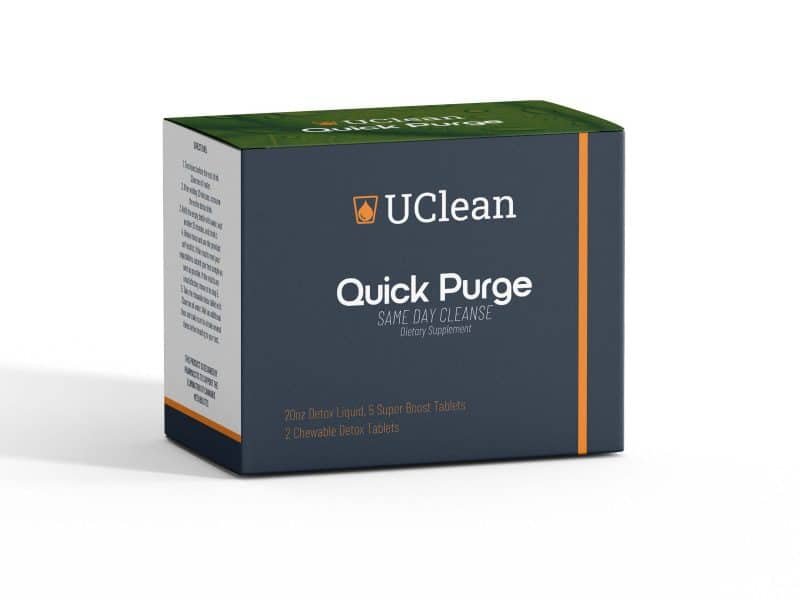
Quick Purge is marketed as a same-day solution for those needing to pass a drug test. The manufacturer claims it works in 60 minutes, creating a temporary “clean window” during which metabolite levels may be reduced below detection thresholds.
According to the manufacturer, the formula works by temporarily halting the release of stored THC metabolites into urine while increasing urination frequency. The product supposedly helps maintain normal urine characteristics to avoid triggering “dilution” flags in lab testing.
The kit includes a Healthy Detox Guide worth $60, providing information about how your body processes marijuana, step-by-step strategies, daily meal plans to aid detox, exercise tips to support the process, foods that may enhance detox efforts, information on supportive natural supplements, and advice on foods to avoid during detox. This educational component is valuable regardless of whether you use the product, as understanding the biochemical processes of THC metabolism can help you make informed decisions about detoxification.
Users should be aware that results may vary significantly based on individual factors including body composition, metabolism, and usage patterns. While some users report success, others find that these types of products do not reliably help them pass drug tests.
Toxin Rid 10 Day Detox Kit
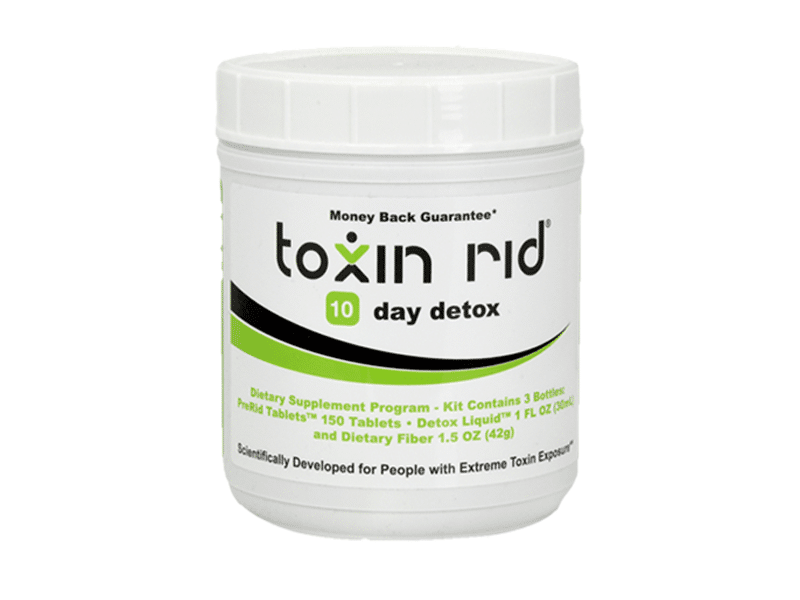
Toxin Rid 10 Day Detox Kit is marketed as a longer-term solution for heavy users. The manufacturers claim it can help reduce the detection period significantly through a comprehensive approach to eliminating stored THC metabolites.
According to the product information, it works by supporting THC metabolism in the liver through a blend of herbs and nutrients that may enhance liver function. The product also claims to help prevent reabsorption of metabolites from the intestines—a process called enterohepatic circulation where bile containing THC metabolites can be reabsorbed instead of excreted. Finally, it purports to support the body’s natural elimination processes through multiple pathways.
The Toxin Rid kit uses ingredients like herbs, minerals, and vitamins. It’s advertised as free from artificial components, fillers, animal products, or synthetics. The recommended regimen involves taking several pills throughout the day, followed by a liquid supplement on the final day and dietary fiber shortly before the test.
Users should understand that even with such products, abstinence is essential during the detox period. The product is designed to complement, not replace, the body’s natural detoxification processes. Even with a 10-day program, some heavy users might not completely eliminate all THC metabolites, especially those who have used heavily for years.
The kit includes 150 pills, 1 oz of dietary fiber, 1 fluid oz of liquid supplement, and comes with free shipping. The comprehensive approach addresses multiple aspects of detoxification, though at a premium price point compared to other options.
Total Purge – Budget Option
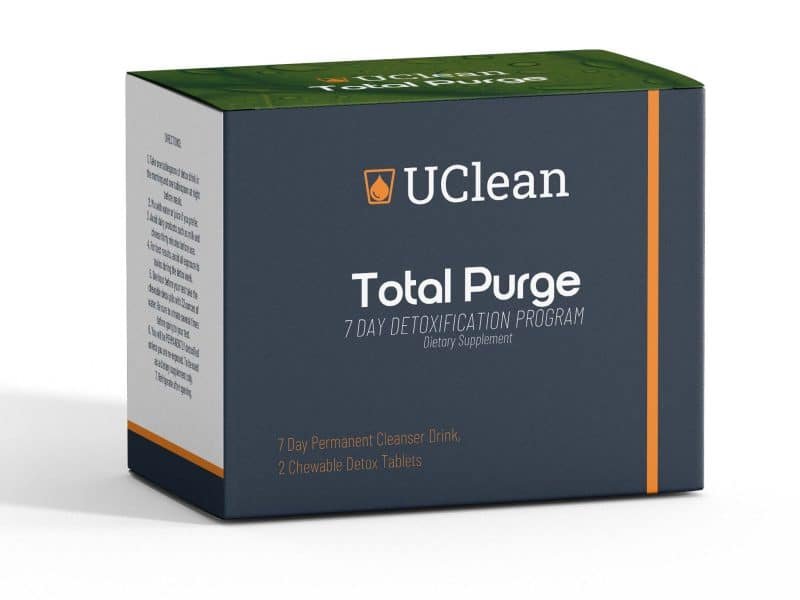
Total Purge is marketed as a detox kit primarily for light users, though the manufacturer suggests heavy users could use it twice consecutively. This makes it a more budget-friendly option for those willing to complete two cycles of the program.
The kit claims to permanently remove substances like marijuana (THC), meth, alcohol, nicotine, and other toxins from your system in just one week through a combination of herbal supplements. However, heavy cannabis users should be realistic about timeframes—a single week is unlikely to completely eliminate THC from long-term heavy users.
The kit includes instructions and a Healthy Detox Guide with information on supporting your body’s natural detoxification processes. While more affordable than some alternatives, users should consider the tradeoff between cost and the more extended timeframe needed for heavy users (potentially 14 days with two consecutive kits).
When considering budget options, it’s worth noting that some evidence-based natural approaches like exercise, proper hydration, and dietary modifications might be equally or more effective than lower-priced commercial products. If cost is a concern, investing in healthy foods and lifestyle changes might provide better value than entry-level detox products.
THC Detox Drinks
Below are some commercially available THC detox drinks. Remember that scientific evidence for their effectiveness is limited, and results may vary considerably between individuals.
Rescue Cleanse
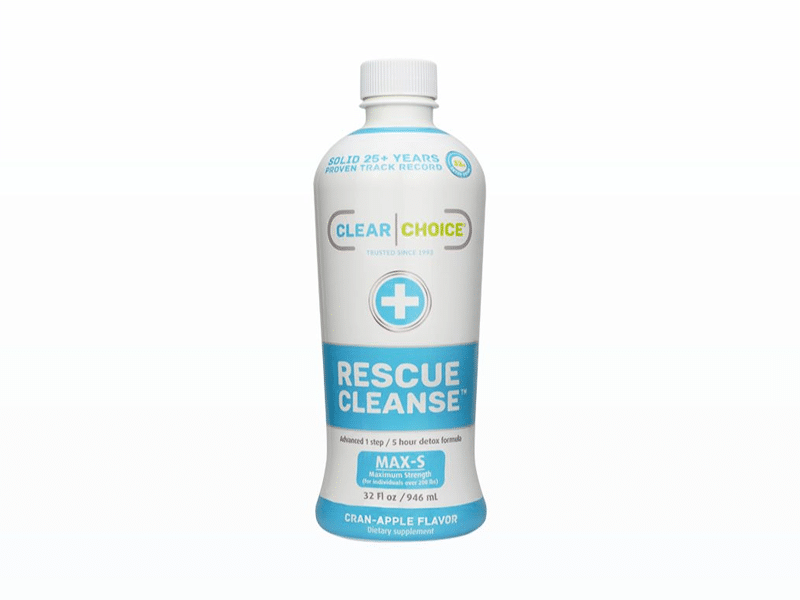
This detox drink comes in cranberry and apple flavor and claims to work quickly. The manufacturer suggests that within an hour, you’ll enter a “Clear Zone” that lasts for up to 5 hours. It’s marketed particularly for individuals with medium to large body mass (200lb+).
The product contains a proprietary blend of herbs and nutrients designed to temporarily reduce the concentration of drug metabolites in urine. Users are instructed to avoid eating for several hours before consuming the drink, which may enhance its effectiveness by preventing new metabolites from entering the digestive system.
For best results, manufacturers typically recommend abstaining from cannabis for at least 48 hours before using these products. This allows time for your body to naturally eliminate some THC metabolites before attempting the final cleansing process. Users should also plan their timing carefully, as the “Clear Zone” is temporary—typically peaking 2-3 hours after consumption.
Mega Clean
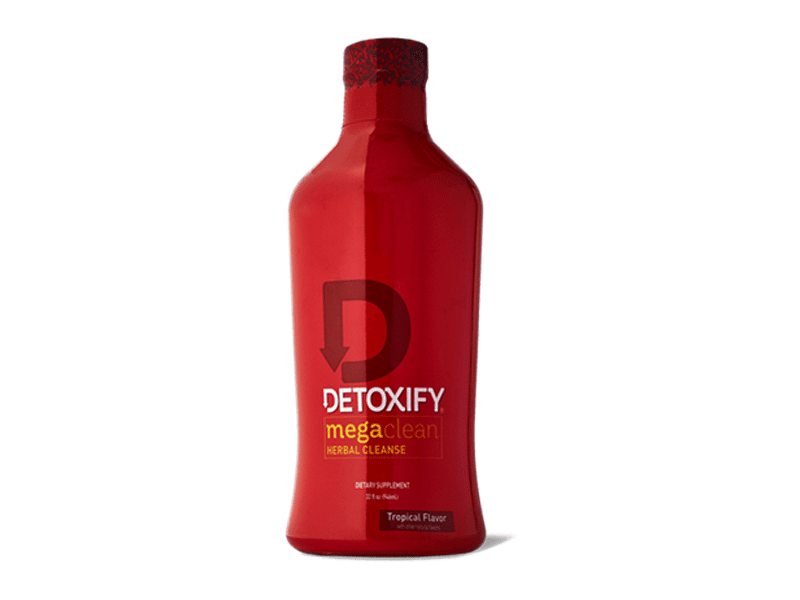
Mega Clean’s detox drink is available in either tropical fruit or wild berry flavor. It’s formulated for those with heavy toxin exposure or larger body mass. According to the manufacturer, it comes in a 1-liter bottle and begins working within one hour, with effects lasting up to five hours and peaking at three hours after consumption.
The product includes six free capsules of Detoxify PreCleanse for preparatory cleansing, which are meant to be taken the day before using the drink. This two-step approach may provide more comprehensive results than drinks alone by beginning the cleansing process earlier.
The drink contains a blend of herbs, minerals, and vitamins that supposedly support the body’s natural cleansing processes while masking the presence of drug metabolites. Users are typically instructed to refill the bottle with water and consume that as well, increasing overall fluid intake and urine production.
As with all detox drinks, timing is crucial. Using the product too early might allow new metabolites to enter your urine before testing, while using it too late might not give it enough time to take effect.
Xxtra Clean
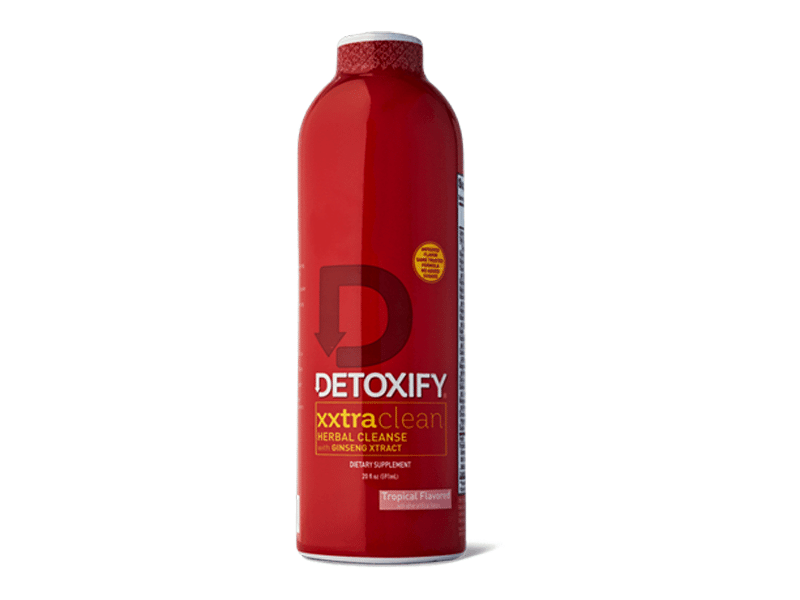
Detoxify Xxtra Clean Herbal Cleanse Drink is marketed for cases of medium toxicity. The manufacturer claims this herbal blend contains ingredients that support your body’s natural processes.
The tropical-flavored, 20-ounce drink is enriched with vitamins and minerals that may help maintain the appearance of normal urine while potentially reducing detectable metabolite levels. According to the manufacturer, it reduces toxin levels within one hour and remains effective for up to five hours, with peak effectiveness around three hours after consumption.
The product includes Pre-Cleanse Pills designed to begin the detoxification process before consuming the drink. This dual approach attempts to provide more comprehensive cleansing than the drink alone would offer.
Users should follow the included instructions carefully, as proper timing and preparation can significantly impact results. Like other detox drinks, Xxtra Clean works best when combined with temporary abstinence from cannabis and proper hydration.
Evidence-Based Approaches to Enhance Natural THC Elimination
While commercial products may offer potential solutions, research suggests several natural methods that may support your body’s ability to eliminate THC more effectively.
The Science of Abstinence
The most evidence-backed approach to THC detoxification is complete abstinence from cannabis. According to research in the journal Clinical Chemistry, THC metabolites will naturally clear from your system over time, though the timeframe varies significantly based on usage patterns.
For occasional users who consume cannabis 1-2 times per week, metabolites typically clear within 3-7 days. Moderate users who partake 3-4 times weekly may need 10-14 days for complete elimination. Heavy users with daily consumption patterns often require 30+ days, with some studies showing detection possible for up to 90 days in extreme cases of chronic, heavy use.
The mechanism behind these extended detection times involves the storage of THC in body fat and its slow, gradual release back into the bloodstream. Each time stored THC is released, it gets metabolized by the liver, creating the metabolites that drug tests detect. This process continues until all stored THC has been processed and eliminated.
Abstinence works because it stops adding new THC to your system, allowing your body to gradually eliminate what’s already stored. No other method is as reliable or effective as simply giving your body enough time to naturally process and eliminate THC metabolites.
Hydration: Beyond Simply Drinking Water
Proper hydration supports overall health and may help with natural detoxification processes. However, contrary to popular belief, simply drinking excessive amounts of water right before a test (known as “dilution”) does not reliably eliminate THC from your system.
Research-based evidence suggests maintaining consistent, healthy hydration of 2-3 liters of water daily supports your body’s natural processes without risking hyponatremia (water toxicity). This approach works not by “flushing out” THC directly, but by ensuring optimal kidney function and supporting the body’s natural elimination processes.
Water alone cannot remove fat-stored THC from your system. Instead, consistent hydration over the days or weeks of your detoxification period helps maintain healthy metabolism and supports liver and kidney function—the organs responsible for processing and eliminating THC metabolites.
Hydration should be paired with electrolyte balance. Heavy water consumption without proper mineral intake can disrupt your body’s electrolyte balance. Consider consuming electrolyte-rich foods like bananas (potassium), leafy greens (magnesium), and sea salt (sodium) alongside increased water intake.
Safety warning: Over-hydration can be dangerous and potentially fatal by disrupting your electrolyte balance. A 2014 case report in the Journal of Emergency Medicine documented acute hyponatremia following excessive water consumption for a drug test. Symptoms of water intoxication include headache, confusion, seizures, and in extreme cases, death. Never consume more than 1 liter of water per hour in an attempt to pass a drug test.
The Exercise Connection
Physical activity may help reduce THC levels through several mechanisms that researchers have begun to understand more clearly in recent years.
Fat metabolism during exercise can temporarily increase blood THC levels as fat stores are metabolized. A 2013 study in Drug and Alcohol Dependence found that exercise can cause a short-term spike in blood THC concentrations as fat cells release stored THC. For this reason, timing your exercise regimen is crucial.
Regular exercise enhances overall metabolic function, potentially supporting faster elimination over time through improved circulation and metabolism. Exercise increases blood flow throughout the body, which may help transport THC metabolites to the liver and kidneys for processing and elimination.
The type of exercise matters. Cardiovascular activities that burn fat, like running, swimming, or cycling, may be more effective than strength training alone. However, a combination of both cardio and resistance training provides the most comprehensive approach to supporting metabolism and fat loss.
Evidence-based recommendations suggest incorporating regular moderate exercise (30-45 minutes, 3-5 times weekly) in the weeks before testing, but avoiding exercise 24 hours before your test as it may temporarily increase blood THC levels. This “exercise window” allows time for any THC released during exercise to be processed and eliminated before testing.
Good activity options include brisk walking or jogging, which can be done without special equipment and adapted to any fitness level. Swimming provides a full-body workout while minimizing joint stress. Cycling, either outdoors or on a stationary bike, offers controllable intensity levels. Strength training with high repetitions and shorter rest periods can help boost metabolism while building muscle.
Nutritional Approaches to Supporting Detoxification
Research suggests certain dietary approaches may support your body’s natural detoxification systems in ways that go beyond common knowledge.
A balanced, low-fat diet may help minimize THC reabsorption from the intestines. A 2014 study in Basic & Clinical Pharmacology & Toxicology suggested that reducing dietary fat may help prevent THC metabolites in bile from being reabsorbed through the intestinal wall. When THC metabolites are excreted in bile, dietary fat can increase their reabsorption back into the bloodstream—a process known as enterohepatic circulation.
Research-based dietary recommendations include consuming lean proteins like chicken, fish, and legumes, which provide necessary amino acids without excess fat. Emphasizing fruits, vegetables, and whole grains provides essential nutrients and fiber while limiting fat intake. Limiting processed foods and saturated fats helps reduce overall fat consumption, potentially decreasing the reabsorption of THC metabolites.
Maintaining adequate caloric intake is crucial, as excessive caloric restriction can slow metabolism and potentially delay the elimination of THC. Instead of severe calorie cutting, focus on nutrient-dense, lower-fat options that support overall health.
Fiber-rich foods may bind to bile containing THC metabolites and promote excretion through feces. Research from the field of pharmacology shows that dietary fiber can bind to bile acids in the intestines, preventing reabsorption of substances excreted in bile—including THC metabolites. This “bound” bile is then eliminated through feces rather than being reabsorbed.
Science-backed fiber sources include chia and flax seeds, which provide both soluble and insoluble fiber along with healthy omega-3 fatty acids. Legumes like beans and lentils offer protein alongside substantial fiber content. Whole grains such as oats and brown rice provide sustained energy with fiber benefits. Leafy greens and berries add antioxidants along with their fiber content.
Antioxidant-rich foods support overall liver health—the primary organ responsible for metabolizing THC. While not directly linked to THC elimination, antioxidants help protect liver cells from damage and support overall detoxification capacity.
Research-supported antioxidant sources include berries (especially blueberries) which contain powerful flavonoids. Cruciferous vegetables like broccoli and cauliflower contain compounds that support liver detoxification enzymes. Green tea provides catechins that have been shown to support liver function. Turmeric and ginger offer anti-inflammatory compounds that may support overall metabolic health. Nuts and seeds provide vitamin E and selenium, important antioxidants for cellular protection.
Sleep Quality: The Overlooked Detox Factor
Research in Sleep Medicine Reviews indicates that quality sleep supports overall metabolic health and detoxification processes in ways many people overlook.
During sleep, your body conducts various restorative processes, including protein synthesis and cellular repair. These processes support overall metabolic health, which may indirectly enhance your body’s ability to process and eliminate THC metabolites.
Sleep deprivation has been shown to affect metabolism negatively and may impair the function of detoxification pathways. Studies show that inadequate sleep can affect liver function, potentially slowing the processing of substances like THC.
Evidence-based sleep recommendations include aiming for 7-9 hours of quality sleep nightly, which provides sufficient time for your body to complete all necessary restorative processes. Maintaining consistent sleep and wake times helps regulate your circadian rhythm, which governs many metabolic processes. Creating a dark, cool sleeping environment enhances sleep quality by supporting natural melatonin production. Limiting screen time before bed reduces exposure to blue light, which can interfere with melatonin production and delay sleep onset. Relaxation techniques like meditation or deep breathing can help reduce stress and promote better sleep quality.
For those experiencing sleep disruption during cannabis cessation, temporary sleep aids might be considered after consulting with a healthcare provider. However, natural approaches like establishing a regular bedtime routine, creating a comfortable sleep environment, and avoiding caffeine after midday often prove effective.
Sauna Therapy: Potential Benefits and Limitations
Sauna use is often discussed as a method for THC detoxification, though the scientific evidence is mixed. The theory behind sauna therapy for detoxification involves inducing sweating to eliminate toxins through the skin.
Research on sauna use specifically for THC detoxification is limited, but studies on general detoxification show that only small amounts of most substances are eliminated through sweat. However, sauna use does increase metabolism and circulation, which might indirectly support the body’s natural detoxification processes.
If considering sauna therapy, remember that safety comes first. Start with shorter sessions (5-10 minutes) and gradually increase as tolerated. Always maintain proper hydration before, during, and after sauna use. People with cardiovascular conditions, pregnant women, and those with certain medical conditions should consult a healthcare provider before using saunas.
The most realistic approach is to view sauna use as a potential complementary method rather than a primary detoxification strategy. When combined with other evidence-based approaches like abstinence, proper hydration, exercise, and healthy nutrition, sauna therapy might provide incremental benefits.
Natural Supplements and Liver Support
While research is limited, some natural supplements have preliminary evidence suggesting they may support detoxification processes by enhancing liver function or binding to toxins in the digestive tract.
Milk Thistle (Silymarin) has been the subject of numerous studies regarding liver health. A 2013 review in Phytotherapy Research found milk thistle may support liver function and detoxification pathways through its antioxidant and anti-inflammatory properties. The active compound silymarin may help protect liver cells and support their regeneration.
Probiotics and gut health have gained attention in recent years for their role in overall wellness. Research in PLoS One suggests healthy gut bacteria may influence the metabolism and elimination of various compounds through several mechanisms. A healthy microbiome supports intestinal barrier function, potentially reducing the reabsorption of toxins. Some probiotic strains may directly influence the metabolism of certain substances, though research specific to THC is limited.
Activated charcoal is sometimes recommended for binding toxins in the digestive tract. While it can bind to many substances, its effectiveness for THC metabolites specifically hasn’t been well-studied. Since most THC metabolites reach the intestines via bile after liver processing, the timing of activated charcoal consumption would be crucial for any potential benefit.
N-Acetyl Cysteine (NAC) is an amino acid that supports the production of glutathione, one of the body’s primary antioxidants involved in detoxification. Some research suggests NAC may support liver health and detoxification pathways, though studies specific to THC elimination are lacking.
Important note: Always consult with a healthcare provider before starting any supplement regimen, especially if you have existing health conditions or take medications. Many supplements can interact with medications or have contraindications for certain health conditions.
Pre-Testing Strategies: The Final 24 Hours
The day before and day of your drug test can be critical for success. Here are evidence-informed recommendations for this crucial period:
Avoid exercise in the 24 hours before your test. While exercise is beneficial during the weeks of detoxification, research shows it can temporarily increase blood THC levels as stored THC is released from fat cells. Giving your body time to process this released THC before testing may improve your chances of passing.
Consume a moderate breakfast the morning of your test. Avoid fasting, which can increase fat metabolism and potentially release stored THC. However, also avoid high-fat meals, which may promote the reabsorption of THC metabolites from the intestines.
Time your fluid intake carefully. Begin hydrating several hours before your test, but avoid excessive consumption right before testing, which could trigger “dilute specimen” flags. Aim for pale yellow urine, not completely clear or dark yellow.
If using commercial same-day detox products, follow the manufacturer’s instructions precisely regarding timing. Most products specify a window of effectiveness (typically 3-5 hours), and testing outside this window may reduce effectiveness.
Consider collecting your urine sample from the “middle” of your stream. The first part of your urine stream may contain higher concentrations of metabolites. While there’s limited scientific evidence for this approach, many toxicologists suggest it may help reduce metabolite concentration in your sample.
Medical Considerations and When to Seek Help
For heavy cannabis users, abrupt cessation may lead to withdrawal symptoms that should be properly understood and managed.
Cannabis withdrawal syndrome, while less severe than withdrawal from substances like alcohol or opioids, can still be uncomfortable. Symptoms typically include irritability and mood changes, which can range from mild annoyance to significant anxiety or depression in heavier users. Sleep disturbances are common and may include insomnia, vivid dreams, or nightmares. Reduced appetite and nausea can occur, sometimes leading to temporary weight loss. Headaches, restlessness, and sweating are also reported by many people undergoing cannabis cessation.
These symptoms typically peak within the first week and gradually improve over 2-3 weeks. For most people, withdrawal symptoms are manageable without medical intervention, but severe or persistent symptoms should prompt medical consultation.
Some individuals may benefit from medical support during cannabis detoxification, particularly those with pre-existing health conditions or those experiencing severe withdrawal symptoms. Consider speaking with a healthcare professional if you experience severe withdrawal symptoms that interfere with daily functioning, have co-occurring health conditions like anxiety disorders or depression that may be exacerbated by cannabis cessation, or are taking medications that might interact with detox supplements.
Those using cannabis for medical purposes should never abruptly discontinue use without consulting their healthcare provider. Medical cannabis users often have underlying conditions that require continued management during detoxification. If you’re concerned about physical or psychological dependence on cannabis, healthcare providers can offer evidence-based approaches to address these concerns.
For individuals with substance use disorders, specialized treatment programs may provide comprehensive support beyond simple detoxification. These programs can address both physical and psychological aspects of cannabis dependence.
Legal and Ethical Considerations
It’s important to understand the legal context around cannabis use and testing before pursuing detoxification methods.
Cannabis legality varies significantly by location. Even in places where it’s legal for recreational or medical use, many employers still maintain drug-free workplace policies under federal guidelines or industry regulations. Certain professions, particularly in healthcare, transportation, safety, and federal employment, have federally mandated drug testing requirements regardless of state cannabis laws.
Attempting to defraud a drug test through adulteration or substitution may have serious legal or employment consequences. Most testing facilities have protocols to detect common methods of sample tampering. Being found attempting to cheat a drug test can often result in more severe consequences than failing the test itself.
Legal and Ethical Considerations
It’s important to understand the legal context around cannabis use and testing:
- Cannabis legality varies by location, even in places where it’s legal for recreational or medical use
- Many employers still maintain drug-free workplace policies
- Some professions (healthcare, transportation) have federally mandated drug testing
- Attempting to defraud a drug test may have legal or employment consequences
Conclusion: A Balanced Approach
THC detoxification is a complex process influenced by numerous factors including usage patterns, body composition, metabolism, and individual health factors. While commercial products may offer potential solutions, the most reliable approach combines:
- Adequate abstinence time
- Healthy lifestyle practices
- Patience and realistic expectations
Remember that individual results vary significantly, and no approach guarantees complete elimination of THC metabolites by a specific deadline.
This article is regularly updated with the latest research and information. Last updated: April 2025.
Additional Resources
Healthy Diet Recommendations
Healthy diet recommendations by the World Health Organization:
https://www.who.int/news-room/fact-sheets/detail/healthy-diet
Center for Disease Control healthy eating tips:
https://www.cdc.gov/nccdphp/dnpao/features/healthy-eating-tips/index.html
Center for Disease Control healthy drinks:
https://www.cdc.gov/healthyweight/healthy_eating/drinks.html
Center for Disease Control how to cut calories:
https://www.cdc.gov/healthyweight/healthy_eating/cutting_calories.html
Healthy recipes:
https://www.nhlbi.nih.gov/health/educational/lose_wt/eat/recipes.htm
Cannabis Research and Information
National Institute on Drug Abuse (NIDA) – Cannabis Research:
https://www.drugabuse.gov/drug-topics/marijuana
Cannabis Cessation Support
Substance Abuse and Mental Health Services Administration (SAMHSA) Helpline:
1-800-662-HELP (4357)
https://www.samhsa.gov/find-help/national-helpline
Remember: This article contains general information and is not a substitute for professional medical advice. Always consult with healthcare providers regarding your specific situation.
